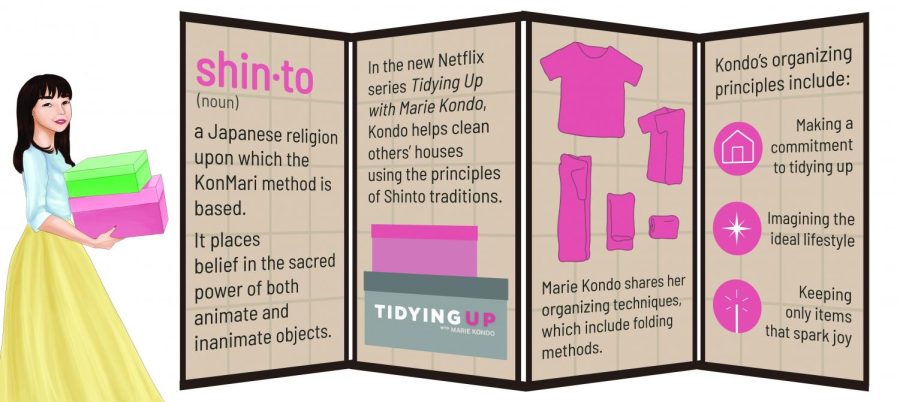Respect Marie Kondo’s Japanese culture
March 1, 2019
Does it spark joy? If it does, keep it. If it doesn’t, throw it away. This is the essential idea behind the KonMari method, created by Japanese lifestyle consultant Marie Kondo to help her clients declutter their homes. Kondo was already a celebrity in the Eastern hemisphere for her guide to decluttering, a book titled “The Life-Changing Magic of Tidying Up.” However, she has been brought into the international spotlight through her Netflix show, “Tidying up with Marie Kondo,” released on Jan. 1, in which Kondo instructs American homeowners on how to clean and organize their houses. But with this new attention also come misinterpretations of Eastern culture.
The goal of the KonMari method is to maintain a living space where the only possessions one has are items that spark joy, the translation of the Japanese word “tokimeki,” starting from clothes, books, papers and miscellaneous items, then finally, sentimental items. The KonMari method draws inspiration from Kondo’s Shinto beliefs, which may seem strange to many Westerners. In the Shinto religion, which is followed by approximately 70 percent of Japanese citizens according to the Japan 2017 International Religious Freedom Report, every entity and phenomenon has a spirit, called a “kami.” Therefore, when Kondo steps into a client’s house to clean and organize, she often invites the client to quietly offer gratitude to the space for serving the client as well to show respect to the kami. She also taps her books before sorting through them to wake the books up and gives gratitude to objects that a client chooses to throw away for serving the client. These practices not only have a cultural background, but often provide closure for clients.
“People have gifted me clothing that I’m never going to wear, and having that moment when you thank the clothing for its service, I think in a way, is cathartic,” said literature teacher Diana Albaker, who has read Kondo’s book and watches her show. “Even though I might not wear this shirt that someone gave me, [it’s nice to] just have that moment [when I can] express my appreciation, but then let go, because it’s okay.”
Inevitably, Kondo has drawn insensitive and snarky commentary from American audiences, including talk show hosts such as Jimmy Kimmel and Ellen Degeneres, who have invited her to their shows to declutter their offices. Kimmel said that the night before Kondo was invited over on his show to declutter his office, he had a nightmare of her destroying his home, implying that her presence would hurt instead of help him. When asked to give thanks to their office, both Degeneres’s writer and Jimmy Kimmel looked at the screen skeptically, pretending to give gratitude and looking up at the camera wondering when the ritual would end. Kimmel handed Kondo and her translator the book “Full Disclosure” by Stormy Daniels, and Degeneres’s writer showed them a promiscuous Kim Kardashian figurine to mock Kondo and her translator despite their sincere efforts to help clean their office. After the segment, Degeneres’s writer said that he had moved everything that Kondo recommended he take out of his room back into the places where they originally had been. Degeneres herself, in an earlier segment done after “The Life-Changing Magic of Tidying Up” was released in 2016, laughed whenever Kondo spoke in Japanese, nodding as she pretended to understand her language. Though some talk show hosts, like Stephen Colbert, have made an effort to respect Kondo, there is a blurred line between between comedy and disrespect.
“I think that Americans view the idea of sparking joy as crazy or too mystic, but it’s a part of Asian culture,” said junior Audrey Ding, who has read Kondo’s book. “They probably don’t understand her method of cleaning and throwing things away because it’s so integral to Asian culture, but not American culture.”
Many have similarly misinterpreted Kondo’s advice, taking to social media to criticize her and make memes out of her for claims she has not made. She has been accused of asking people to keep a maximum of 30 books, though she merely said that she herself preferred to do so. People have also associated Kondo with minimalism, a movement in which people are encouraged to keep as little as possible in their homes, and accused her of asking people to throw everything out. However, Kondo herself has asserted that the focus of the KonMari method is not on what to throw away, but what to keep, and that necessities that may not directly spark joy should be kept too. For example, when tidying up with comedian Hasan Minhaj, Kondo reassured him that it was okay to keep his baby monitor in his office, because “this does spark joy for you knowing that you can work peacefully and that your child is safe, right?”
“I don’t think it’s really about minimalism, because for me, a lot of it is that your home kind of reflects how you feel and your mood,” Albaker said. “From everybody I’ve seen on the show, and just the stories she’s shared, once people have eliminated the things that are unnecessary, they feel freer. So I think it’s less minimalism and more that maybe here [in America] we just have more stuff.”
Much of the backlash to Kondo roots from the innate discomfort that comes with being exposed to a new culture. Because of our limited understanding, people feel it is foreign and unable to be assimilated into their culture, so instead, they pass it off as a trend, or something to mock.
“We are a society that sometimes is nervous about other spiritual beliefs and practices,” said Japanese teacher Jeremy Kitchen, who has lived in Japan. “And I think that also ties into people’s reaction of, ‘Oh, is this like one of those [fads],’ so I think trying to be willing to learn about something without having to agree with it or disagree with it, but just being aware of it and understand it, would help people understand the whole [of the idea].”
While people may excuse themselves for being rude to Kondo and other Japanese individuals as Americans who simply do not understand, being from a different culture is no reason to disrespect other cultures. There is no excuse to not do research beforehand on the nuances of another culture before commenting on it.





























































yesenia • Jun 15, 2019 at 2:00 am
I agree there is a cultural divide, but that should not be interpreted as anyone intentionally disrespecting Marie Kondo. After all, while she was a guest on those shows (Ellen and Jimmy Kimmel), they are in the US where we can discern humor without offense.
I might agree on interpreting a lack of respect IF Ellen and Jimmy Kimmel were to meet with Kondo in Japan, however, she resides in the US. It could also be said that for anyone to criticize these comedians, who routinely highlight oddities as being humorous, is being equally disrespectful to their professional methods.
I think to assume Ellen and Jimmy were being disrespectful to Marie is overreacting and an example of being overly sensitive. Did Marie, herself, claim she was offended? I haven’t found a source which mentions this, so, if not, then perhaps it’s disrespectful for others to speak on her behalf.